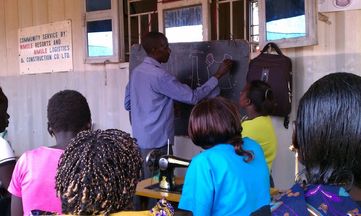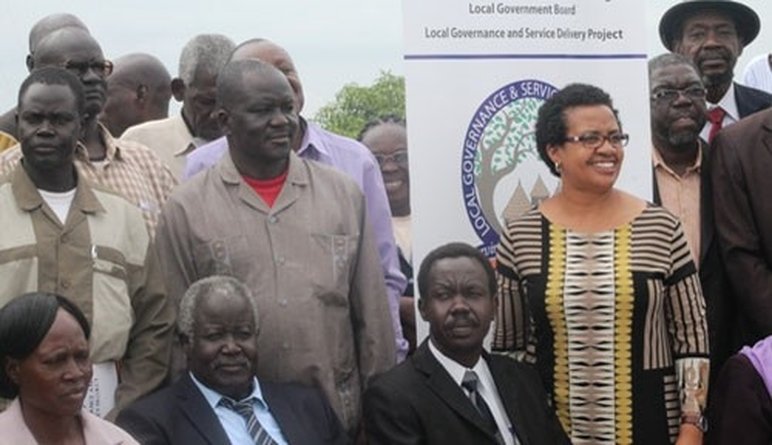|
Tarnjeet Kang, Ph.D Candidate, University of Illinois, Urbana-Champaign  Women's Empowerment Program in Juba, South Sudan. Photo Credit: Tarnjeet Kang. Women's Empowerment Program in Juba, South Sudan. Photo Credit: Tarnjeet Kang. Walking around the central city area of Juba, South Sudan’s capital, it is difficult to miss the copious signs directing people to the compounds of CSOs, NGOs, and other international organizations such as the numerous United Nations agencies. Many of the public institutions scattered across the city also bear markers of international sponsorship. This phenomenon is replicated in the hearts of state capitals across the country. While the presence of foreign interventions in South Sudan has been discussed colloquially, the implications and long-term consequences, particularly within the context of a neoliberal era of development, has not been critically investigated thus far.  Wau State Governor Elias Waya in a group photo with officials from LOGOSEED after the launch of the new project in Wau [Photo| James Dimo Wau State Governor Elias Waya in a group photo with officials from LOGOSEED after the launch of the new project in Wau [Photo| James Dimo Neoliberalism, within the context of development, supports the development strategies proposed in the Washington Consensus: free market principles, the privatization of select government entities while also re-orienting and reducing public spending to support growth. Neoliberal policies, when applied to development at the community level, often removes the national government as a key stakeholder at the decision-making table, or at the very least minimizes its role and responsibilities. The macro-level discourse on neoliberalism within international development has been subject to increasing challenges this year, pushing against the dominant narrative that such approaches to economic growth are the key to improving development within third world countries. In a reversal of decades of economic development policy, the IMF recently released a statement indicating that neoliberalism was in fact not the panacea it was sold to be in the 1980’s when it became a part of formal policy in the funding entity.[1] Author Naomi Klein recently stated in an interview with Democracy Now that “neoliberalism was never first and foremost an ideology. The ideology was always the cover for the greed”.[2] In essence, the political agenda and ramifications of neoliberal policies inherently contradict the goals of community-based empowerment programs. The literature on neoliberalism within international development in South Sudan is severely lacking, which is problematic given the significant amount of money being invested in the country by private companies, NGOs, the United Nations and donor countries, as well as the role that these entities are playing in creating a national infrastructure and government. The increasing dependency on international stakeholders for social and economic development, as well as the creation of governance institutions, is presenting a neoliberal threat to the stake of South Sudan’s communities in their country’s governance at the local level. One particular way in which neoliberal policies have manifested in South Sudan is through the disguise of internationally funded community empowerment programs. These programs often give the illusion of empowerment and choice on the part of communities, while in actuality creating regulations and restrictions that inherently dictate how, where and for whom development occurs. In this sense, the “free market” approach purported by neoliberal policies in fact never really exists; community members are given a controlled number of pre-determined options to utilize to develop their communities, which are tightly regulated according to international standards of accountability and funding priorities. Beginning in the 1990’s, an increasing number of non-governmental organizations and international donors began implementing programs and services in Southern Sudan. Their presence proliferated following the signing of the Comprehensive Peace Agreement in 2005, and again after independence was achieved in 2011. This phenomenon also meant that multiple external stakeholders were inserted into South Sudan’s governance narratives and institutions, at local, state and national levels. As a result, multiple factors are shaping the discourse on local governance in South Sudan, in addition to the voices of the country’s citizens and leaders. This includes programs initiated by the World Bank and a variety of NGOs that purport to strengthen local institutions. One key example of this is the World Bank’s Local Governance and Service Delivery Project, still in its early stages. The project aims to support the country’s decentralization policy and institutionalize Payam (district) level committees.[3] While the national Ministry of Finance assists in the distribution of funds, the program bypasses national governance infrastructures for the most part. While this was initially done to avoid the siphoning of funds earmarked for communities through corruption, it also diffuses responsibility from the Government of South Sudan to provide services and funding to its citizens. Previous programs with similar goals that were hosted by the national government, such as the Constituencies Development Fund (CDF), have not received funding from the national legislature since 2010. As a result, communities have now acquired the responsibility of meeting their own needs, at times with the assistance of international donors, even with they do not have the information, resources and decision-making powers to effectively do this. Within the education sector, the Girls Education South Sudan (GESS) program provides grants to individual female students as well as to schools. With the aim of increasing access and attainment within education for girls in South Sudan, the program also implements services that seek to improve the quality of education provided in the country as a whole.[4] One of the key requirements for schools to be eligible for the capitation grants is to have a Parent Teachers Association (PTA) or similar governing body.[5] While in a decentralized context PTAs can act as a democratic and accountability mechanism, this is only possible when such institutions are functional, autonomous and participatory. Communities and schools are not necessarily provided with the resources, guidance and training needed to create PTAs that are effective at serving their purpose. As a result, there is an increasing risk that such institutions exist in name only, in order for both public and private schools to be eligible for the funding they often desperately need to improve their institutions. Both of these programs are fairly new, and therefore sufficient research does not exist yet to evaluate the effectiveness of this approach to development in South Sudan. Even then, monitoring and evaluation reports that will be released by the stakeholders, who are often the creators and founders of the programs, will contain inherent biases in the values and standards used to measure progress and success. This in turn also places the risk of assuming responsibility for failures on communities in South Sudan, who often have no political resources for diffusing this responsibility to those that designed the programs in the first place. Such programs co-opt and devalue organic examples of community self-determination in South Sudan, including Dr. Garang’s policy taking “the towns to the people” or historical examples of citizens organizing to provide food, education and healthcare to their communities during the civil wars. When the creation of governance institutions, structures and functions are hijacked by foreign entities, this also undermines democratic processes in South Sudan and presents a threat to the possibility of a country being created in the eyes of its citizens that is responsive to their needs. The implications of leaving these manifestations of neoliberalism unaddressed remain dire – the institutionalization of NGO-Isation (over-dependency on NGOs),[6] the creation of a neocolonial state that perpetuates South Sudan’s history of governance that does not represent or act in the interest of the country, as well as a perpetual dissonance between the needs of the people and the public services provided. At the time of independence in South Sudan in 2011 it was estimated that approximately 80% of social services such as education and healthcare were supported by NGOs.[7] This rate of dependency is equivalent to that of Haiti, where the lack of public institutions and services has greatly inhibited political stability and economic development for decades. A mirrored path in South Sudan would render millions of dollars in assistance and investment void, while also undermining the liberation movements that the country’s citizens have paid hefty prices for. Developing a discourse on neoliberalism in South Sudan is imperative in informing future discussions on how local governance occurs in South Sudan. This is particularly important at this point in time in the country’s history as South Sudan creates a new government, and begins, yet again, a post-conflict phase of development. Reference: [1] Ostry, J.D., P. Loungani and D. Furceri. (2016). Neoliberalism: Oversold? Retrieved from http://www.imf.org/external/pubs/ft/fandd/2016/06/pdf/ostry.pdf [2] NPR. (2016). “Our Dreams Don’t Fit on Your Ballots”: Naomi Klein on Next Steps for Pro-Bernie Sanders Movement. Retrieved from www.democracynow.org/2016/6/20/our_dreams_dont_fit_on_your [3] World Bank. (2013). International Development Association Project Appraisal Document on a Proposed Credit in the Amount of SDR32.5 Million (US$50.0 million equivalent) to the Republic of South Sudan for a Local Governance and Service Delivery Project. Retrieved from http://documents.worldbank.org/curated/en/770181468101966036/pdf/723220Revised001300IDA0R20130003902.pdf [4] GESS. (2016-a). About GESS. Retrieved from http://girlseducationsouthsudan.org/about-gess/ [5] GESS. (2016-b). Capitation Grants. Retrieved from http://girlseducationsouthsudan.org/capitation-grants/ [6] Hearn, J. (1998). "The NGO-isation" of Kenyan society: USAID and the restructuring of health care. Review of African Political Economy, 25(75), 89-100. [7] Saferworld. (2011). Background Paper: Local views on international aid in situations of conflict and fragility. Retrieved from < http://www.saferworld.org.uk/Saferworld%20background%20paper%20-%20local%20views%20on%20aid%20in%20situations%20of%20conflict%20and%20fragility.pdf > on September 23, 2012.
2 Comments
Atem
6/25/2017 05:07:13 am
I have no expertise in this area, however, I can't see neoliberalism functioning in the chaos of South Sudan. For neoliberalism to work, two basic elements must be present 1) rule of law, and 2) strong institutional arrangements. South Sudan has none of these at the moment. However, I agree that NGOs and development agencies in eluding financial institution would like to entrench system that provide some basic framework for when South Sudanese settles down and institution begins to emerge once the rule of law is established.
Reply
Tarnjeet Kang
7/14/2017 09:30:43 am
Dear Atem,
Reply
Your comment will be posted after it is approved.
Leave a Reply. |
Archives
October 2023
Categories
All
|
Copyright © 2023 The Zambakari Advisory - Privacy Policy
Our site uses cookies to improve your experience. You can control cookies by adjusting your browser or device settings.
If you continue without changing your settings, we assume that you are happy to receive all cookies.
If not, please feel free to opt out here.
SEO by Qasim Khilji
Our site uses cookies to improve your experience. You can control cookies by adjusting your browser or device settings.
If you continue without changing your settings, we assume that you are happy to receive all cookies.
If not, please feel free to opt out here.
SEO by Qasim Khilji
